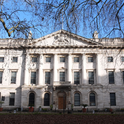Over 50 years old in its current form, PMQs was introduced under Winston Churchill in 1961, though the first Prime Minister to take formal questions at a set time was Gladstone, for whom parliament ruled that questions should be asked at the end of the day to save the then-ailing old chap from having to get up too early.
Here are four reasons why, like Gladstone, this noble but faded institution should be allowed to gracefully retire...
The public don't like it
Parliament, as anyone who works in or around it can tell you, is a rich and varied institution. However healthy you think it is overall, a huge diversity of work goes on inside its crumbling walls; beyond the (multiple) debates held most days from Monday-Thursday in the Commons chamber, there are select committees to scrutinise departments and bills, All Party Parliamentary Groups where MPs work cross-party on special interests, events run by lobbyists of the shady and less-shady kind, questions to ministers where they are held to account for decisions taken or mistakes made, a constitutional library to assist MPs with amendments to bills and acts, official visits and receptions—the list goes on and on.Much of the public aren't aware of this. Instead, as a Hansard Society report published last year found, they "see Parliament through the prism of the House of Commons chamber. They commonly assume that PMQs is therefore how Parliament works all the time." And they don't like what they see: 67 per cent think it's too full of party political point scoring (only 5 per cent disagree), and just 12 per cent agree "it makes me proud of our parliament," while 45 per cent disagree. Respondents to Hansard's survey do see upsides: many find it "informative" and think it addresses "the issues of the day," but it isn't hard to conceive of alternative formats which fulfil these objectives without MPs mooing at each other like a bunch of angsty cattle. Which leads me to...
There are alternatives
Most obviously, Ed Miliband has proposed replacing PMQs with a "people's question time," in which members of the public get to come and heckle the Prime Minister once a week. It's easy to be sceptical about his motives—the Labour leader is widely considered to be at his best when dealing with informal Q+As rather than anything too taxing such as discussing the deficit or a bacon sandwich. It's also arguable that questions from untutored members of the public who don't have teams of dirt-digging researchers won't be able to really press a Prime Minister on policy as much as necessary. But as a starting point for developing a more engaging format it isn't bad.But less talked about are all the alternatives to Prime Ministers questions which already exist. Select Committees—cross party groups of MPs focused on a particular specialism which scrutinise government departments, public figures or bills—have become much more powerful in the past five years. The rules were changed at the beginning of this parliament, meaning that the Chairs of these committees are now elected by all MPs, not by the MPs on each committee, and it is pre-agreed which party a chair should be from, giving government whips less influence. Hardline committee chiefs like Margaret Hodge have since gained a reputation for taking ministers and businesspeople to task. But perhaps more importantly, the Liaison Committee, a kind of supergroup made up of other committee heads, regularly grills the Prime Minister in often impressive depth about matters of public policy. This is certainly more challenging than the half-baked, unfocused mauling Cameron faces at PMQs, or in other words...
PMQs is not that effective
PMQs should have, broadly speaking, three functions. It should allow MPs to raise issues which matter to their constituents and more or less nobody else in front of the PM. It still does this, as anyone who has sat through some mumbling member's paean to a much-needed bypass or successful shopping centre can tell you. But on its other functions it fails: it should allow the leader of the opposition to hold the Prime Minister to account for his or her actions and the behaviour of government. It doesn't: both the PM and the opposition leader's volleys are so well rehearsed that they rarely tell us anything new—rare exceptions like the time last year that Miliband quoted Lord Freud voicing some iffy views about disabled people send journalists into paroxysms of excitement.And, lastly, it should allow backbench MPs to raise whatever issues they want and get a fair hearing. That sometimes happens, but anyone who watched Inside the Commons will also remember the dismay among some MPs at the pressure to ask pre-scripted questions sent round by party whips. The questions—on the government benches designed to make the PM look good, on the opposition designed to press home a message—are often farcical, and some MPs don't even get the lines right: Tory MP Guy Opperman earlier this year asked about a "long term economic recovery plan."
Parliament is changing
Almost certainly, after this May's election, we'll have another hung parliament. We could end up with another relatively simple two-party coalition, or we could end up with some kind of multi-headed, vote-by-vote monstrosity in which each decision hinges on a game of rock paper scissors in Westminster hall between Ed Miliband, Alex Salmond and Natalie Bennett, with an emissary sent outside to consult Russell Brand. Who knows.Either way, a format in which the head of one governing party is held to account while the other(s) sit and look like they want to disappear a-la Nick Clegg is not fit for purpose. If David Cameron were the man ultimately responsible for a decision, but Nigel Farage, honourable member for South Thanet, was the one who put him up to it, wouldn't you want a chance to question both?












